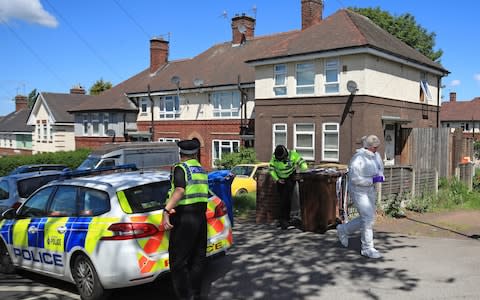Mother jailed for 35 years after murdering teenage sons to stop social services taking them away
A mother killed the teenage sons she conceived with her half-brother out of fear they would be taken into care, a court heard as she was jailed for 35 years.
Sarah Barrass, 35, plotted to kill all of her children with the help Brandon Machin, her half-brother and father to the six youngsters, at the family home in Sheffield on May 24.
Tristan and Blake Barrass, 13 and 14, were strangled by the couple after an attempt to poison four of the children had failed the night before, Sheffield Crown Court was told.
The mother feared social services were going to place her children into care - an experience which left her scarred as a child - and told Machin, 39, they “were better off dead”.
Police were led to believe the eldest sons were away when they arrived at the property, but realised the grim reality when one of the younger children drew a finger across his throat.
Both boys were found lying on their beds with bin bags over their heads.
On Tuesday, Barrass and Machin were both jailed for life with a minimum of 35 years after pleading guilty to two counts of murder, conspiracy to murder six children and five counts of attempted murder.
Mr Justice Goss, sentencing, said to Barrass: "You considered your love for them and fear of being parted from them entitled you to take their lives as well as your own."
Fresh details about the couple’s conspiracy to kill the children came to light during a harrowing sentencing hearing.
Medication used by the children had been gathered up from around the "unkempt" home on May 23 and portioned to four of them.
Barrass, the court heard, expected them to die during the night and made "light-hearted" Facebook posts that the children had caught a sickness bug.

But when she realised her plan had not worked, the mother began searching the internet for alternative methods of killing - including suffocation, strangulation and drowning.
She then called Machin to the house and the pair strangled Blake, followed by Tristan, before attempting to drown a third children.
The surviving children were taken into a bedroom by Barrass, who called the police.
The mother-of-six had previously requested help from Sheffield City Council with the children, the court heard.
In a text to a friend, she revealed her deeply held fear about the childcare authorities.
She wrote: "I've thought of every possible solution to this mess. Mass murder, putting them all in care, checking in to the local nut house.
"I love my kids too much to kill them, I can't put them into care for the same reason."
On another occasion, a visitor to their home heard Barrass saying to the children: “I gave you life, I can take it away.”
It is understood a meeting took place between the mother and social workers at some time before the killings, but nothing in her conduct had given rise to significant concern.
A serious case review has now been launched to examine whether any opportunities were missed by social services to save the lives of the children.
Reports that a family member had raised concerns about the children’s welfare on several occasions with the authorities is disputed by the service.
Her defence, Bryan Cox QC, said that she was "profoundly damaged by her childhood" and spent time in the care of social services.
Following sentencing, John Macilwraith Executive Director of People Services at Sheffield City Council, said: "Our focus continues to be the wellbeing of the children from this family now in our care. They are safe and receiving good support through this traumatic time.
“The Sheffield Children Safeguarding Partnership has initiated a Serious Case Review (SCR) to investigate what happened.
“The national SCR panel have endorsed this and agreed that the review should go ahead locally. The council will be cooperating fully with the review and are already working to provide the relevant information.
“This is such a tragic and, we hope, isolated case that it is vital to examine every aspect in order to establish what can be learned to inform the development of future professional practice.”
It is expected the review will take up to six months.

 Yahoo News
Yahoo News 